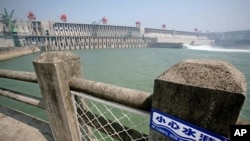Cities and provinces along the Yangtze River in central China are grappling with the country's worst drought in more than 50 years. Resource analysts say the drought highlights not only the impact of climate change, but also China's persistent problem of water scarcity and how it must balance that with the country's enormous demand for energy and economic growth.
Poyang Lake is the largest freshwater lake in China and is just one example of how serious the drought has become. The lake, which is located in Jiangxi province along the Yangtze River, has shrunk to less than half its usual size, and the lack of water has had a major impact on nearby fishing and farming.
With water levels so low, stretches of the Yangtze River have become impassable for cargo vessels, disrupting supply chains that fuel factories along the river, and transport manufactured products and agricultural goods. Analysts say the river is used to transport about 100 billion tons of cargo each year.
Robert Kimball, a project coordinator at the World Resources Institute in Washington, says the drought is also affecting electric power production.
"There is a lot of hydropower in the Yangtze River basin. For example, the Three Gorges Dam and power production from those sources has gone down by 20 percent according to some estimates as a result of this drought. Any company that relies on that power is feeling the impact. Some are even being forced to ration their power use," he said.
To help ease the effects of the drought, Chinese authorities have begun releasing massive amounts of water from the Three Gorges Dam to raise water levels.
The drought's impact on power generation and commerce, Kimball adds, highlights the complexity of the problem.
"When you conduct something like water and power rationing, which is what we are seeing in the Yangtze River basin now, you have companies and governments in China trying to decide what type of sector, what type of use is the most important, the most critical and most productive use for our limited water resources," he said.
Keith Schneider, a senior editor at Circle of Blue, an international consortium of journalists and scientists that focuses on global water resources, says water scarcity is a growing problem in China.
“China has been losing moisture steadily since 2000, according to their National Bureau of Statistics. In fact, they’ve lost 35 billion cubic meters of water annually since 2000. That’s 350 billion cubic meters in total for the country. And 350 billion cubic meters is a boat load of water. It’s as much water as flows down the Yangtze River and past Shanghai in eight months,” Schneider said.
Chinese meteorologists say climate change is wreaking havoc on the country's water supply.
The construction of dams along the Yangtze River is also a contributing factor, Schneider says. Up river from the Three Gorges Dam, there are 100 dams in various stages of construction that, much like the Three Gorges Dam, will have large reservoir.
"So filling those lakes is both a hindrance and a help because there is water stored there, so you can release it into the river. But the fact is that those lakes also have to be filled in order to produce power from those hydropower dams," Schneider said.
To limit its use of water, China is aggressively expanding its production of alternative energy and is exploring ways to reuse its water resources in big cities.
Even so, water is a key component of the complex web of resources and energy generation that keeps China's massive economy growing. Coal production, for example, helps China fuel its economic growth and accounts for 23 percent of the country's water use.
"They [China] are bursting at the seams in everything. They need more water; they need more energy; they need more coal. They just need so many resources and the competition for energy, water and food there has come to a really important choke point, both in the north and the south. And this drought in the Yangtze River - the longest and largest river in that country - is just emblematic of all of that," Schneider said.
According to Chinese state media, the drought has affected more than one million hectares of farmland in seven provinces in central China. Local government officials reportedly have fired more than 4,000 cloud-seeding rockets into the sky to try to bring rain to parched regions along the river. The forecast, however, continues to be for little rain until at least next month.
China Grapples with Worst Drought in More Than 50 Years




